MIP network member Yana Gallen is an Assistant Professor at the University of Chicago Harris School of Public Policy. She is a labor economist studying the gender wage gap. Her research focuses on understanding the sources of the gender pay gap--preferences, discrimination, or productivity. She is also interested in the impact of family friendly policies on the labor market, particularly looking at indirect or unanticipated effects of policy reforms. Many of her projects use Danish register data linking workers and firms. Her current work focuses on the savings and career decisions of household before they know their preferences concerning child-rearing. Gallen received a Ph.D. in economics from Northwestern University in 2016.
Describe your area of study and how it relates to current policy discussions surrounding inequality.
I am interested in understanding the sources and consequences of the gender pay gap. I think generally policy is zooming in on the right tension: motherhood and work. Becoming a parent really exacerbates the gender pay gap. However, I think we may be moving in directions which will only exacerbate gender differences in careers and pay. Policies centered on paid leave, for example, focus on making it easier to leave the labor force so that new mothers can focus 100% of their energy on childrearing. My concern with this is that it perpetuates the myth of the perfect mother: she breastfeeds on demand until the child is 1 year old, she doesn't sleep train, she makes her own baby food (just for fun!), and she is always available and present for her children. Doctors, nurses, and policy makers could do a lot of good by moving away from dramatic and unscientific messaging concerning motherhood as martyrdom. I think real progress in the pay gap will be made when women think of motherhood as a part---not as the entirety---of who they should be.
A great deal of research on the gender pay gap suggests that work interruptions around childbirth are a real source of divergence in the careers of men and women. In many fields, continuity really does matter. Being away from work for a long time after childbirth means you have little familiarity with projects, clients, etc. and career growth can really take a hit. Perhaps because of this, women tend to favor those occupations where time off is not too costly in terms of skill depreciation.
Because segregation in terms of occupational choice is so important for understanding the pay gap, we need to understand when and why women make the career choices they make. How much is due to discrimination? how much due to preferences? How malleable are those preferences and what influences them? The last is a question I'm working on now in work with Melanie Wasserman at UCLA Anderson. We study college students making decisions about their future careers, focusing on the informal conversations people use to gather information about job paths. We find big differences in the propensity for professionals to emphasize work/life balance issues to female students relative to male students. These students are young, and most probably don't plan on having families any time soon. Nonetheless, the work/life balance issues professionals are encountering in their midlife spillover into conversations with much younger students. Perhaps that is for the best, but perhaps not. Disentangling how the messages we receive interact with our environment and choices is a difficult and fascinating goal.
What areas in the study of inequality are most in need of new research?
This is not my area—yet—but I think that we understand very little about the importance of inequality driven by social status. There are many unspoken norms in, for lack of a better word, “polite” society which I know I violated as someone who grew up poor in an immigrant family with very different norms. What I most remember learning in college was how to behave around my friends and supervisors who a very different background than me. I think that we have too little evidence on the importance of these social norms, as well as the information gaps they leave those not “in the know” with. In a society like ours, where feedback is rarely direct and most people are polite, one might have to rely on subtle cues to reveal whether someone is just being nice or genuine in their support. We have a lot of qualitative evidence that this stuff matters for career and social opportunities, but I think we need more quantitative work here on exactly how important these constraints are.
What advice do you have for emerging scholars in your field?
I recommend that you only research what you are genuinely interested in. For me, it’s very tied to my personal experiences. For others, it may look different. But I think the world would be a better place if people listened less to what others tell them to study. Find a question you really want to I know the answer to. Listen to others a little more for how to go about answering it rather than what to ask. But my second piece of advice is to remember that most advice is bad advice. So do with that what you will.



